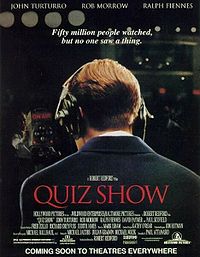Quiz Show
Posted by J on December 6, 2008
 Quiz Show is a fine morality play about lying and its consequences. What’s even better is that it binds this moral problem to the medium of television. You see, as TV watchers we don’t even realize the fiction of television. It’s quite easy to get sucked into passive-viewing mode when watching the TV. In that mode, we believe everything we see. But everything on TV is carefully constructed for entertainment purposes, for the sake of ratings, which means advertising money. That includes reality shows and real-time events. But we rarely watch TV with that in mind. We are mere consumers of TV programs, which means we set ourselves up to be suckers.
Quiz Show is a fine morality play about lying and its consequences. What’s even better is that it binds this moral problem to the medium of television. You see, as TV watchers we don’t even realize the fiction of television. It’s quite easy to get sucked into passive-viewing mode when watching the TV. In that mode, we believe everything we see. But everything on TV is carefully constructed for entertainment purposes, for the sake of ratings, which means advertising money. That includes reality shows and real-time events. But we rarely watch TV with that in mind. We are mere consumers of TV programs, which means we set ourselves up to be suckers.
In Quiz Show, Charles Van Doren has been sucked into the world of game shows. As a contestant on Twenty One, he finds instant celebrity. He likes the attention, the cameras, the cover of Time Magazine. What’s worse, Van Doren chooses to be part of Twenty One’s rigged outcomes. The producers of the game show choose which contestants will win the show, in order to boost the ratings. They like Van Doren, and Van Doren likes being on the show. So he cheats.
But Van Doren is the latest in a line of old New England WASPs, and as a literature instructor at Columbia with a master’s degree in astrophysics and a Ph.D. in literature, he also realizes that game shows are silly entertainment. His father is a Pultizer-Prize winning writer, his mother a famous novelist herself. Van Doren’s fame is different than theirs, inferior in every way, and he feels it. Public scandal would bring the family dishonor, and so Van Doren tries his best to lie to cover up the game show fraud. Lying here begets more lying.
Pushing Van Doren to reveal the truth is Dick Goodwin, a government agent who’s investigating quiz shows. Goodwin befriends Van Doren while pursuing him, and this complicates Goodwin’s investigation. Goodwin has to use witnesses such as Herbert Stimpel, a former Twenty One contestant and a doofus who loves the limelight. Goodwin hates having to side with the likes of Stimpel — at one point he vomits after hearing Stimpel’s egotistical ravings — but Goodwin would rather not publically implicate his friend, Van Doren.
Quiz Show‘s strengths are numerous — acting, directing, writing — which is why it’s imminently watchable. Best of all, perhaps, is the melancholy outcome. Justice is served, but not in the way which implicates the big boys. Quiz Show intimates that the government (here, Congress) and the highest levels of corporations are in cahoots, and that — at least at the show trials known as Congressional hearings — the truthtellers are only those who feel the weight of their own guilt. Consequently, when money is on the line, personal guilt is a rare thing. Goodwin’s summary of the hearings is apt: “We were supposed to get television, but television got us.” His statement implies that television will continue to get us, and here in 2008, this seems accurate.
It is worth mentioning that there are moments of incoherence in Quiz Show. Goodwin’s one-man investigation has no motivation, apart from the fact that he seems to have nothing else to do. Worse, the end of the movie suggests that government regulation of the television industry would be a good solution to the problem of rigged gameshows. This makes little sense. If Congress can’t conduct a show trial honorably, would it regulate gameshows more honorably than NBC and Geritol? Of course not. But the idea that government regulation of communication networks and freedom of speech can even co-exist is a joke. When the government regulates a medium, it has the authority to say what can and cannot be said or aired. Liberals like Robert Redford (the director) have never figured out this contradiction. Give them a government hostile to their views, and they’re all for freedom of speech. Give them a government favorable to their views, and they’re for regulation. Same for so-called conservatives. The nerve.
Quiz Show is based on a real scandal from the 1950s, but we don’t take it to be accurate history. We prefer not to even consider its relation to history at all. Goodwin, for example, became a speechwriter for John F. Kennedy, and any presidential speechwriter is not exactly the kind of person we’d expect to be the exemplar hero who strives for truth and justice. The movie should’ve changed the names of its characters — if you aren’t striving for accuracy, why characterize living people as something they are not? At least the movie tries to put game shows, and TV for that matter, in a proper perspective.
Entertainment: 8
Intelligence: 6
Morality: 9 (about six unnecessary words)
Leave a comment